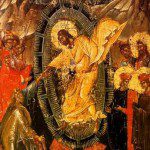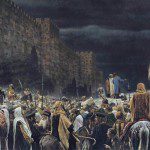
every riven thing
I have returned with renewed gratitude over these past few months to Christian Wiman’s poem “Every Riven Thing” for this striking assurance:
God goes, belonging to every riven thing he’s made
sing his being simply by being
the thing it is . . . .
As two friends recently traveled the last stretch of their journeys on this planet, life seemed, indeed, a “riven thing,” and we, whom they were leaving, riven again with loss. And God goes with us into it, belonging.
During the same months, as political upheavals, accusations, and outrage have escalated, and Yeats’ dire warning of a time when “the centre cannot hold” has seemed appallingly pertinent, I have also found consolation in Leonard Cohen’s reminder that “there is a crack in everything / that’s how the light gets in.”
We live among—and are–what is riven, cracked and split, having to revise our understanding of healing and wholeness as we age into inevitable learning that those words don’t mean a fairy-tale ending, or closure, or even a denouement at the end of the last act. “No matter how old you are,” my husband observed at my 94-year-old mother’s funeral service, “when you go, the story seems incomplete. Because we don’t get the completion here.”
We get beginnings. The Buddhist term “beginner’s mind” has been helpful to me in learning to recognize the distance between the play of events in a messy, discursive life story and the neat closures and certainties one might wish for. And so we begin . . . one story ends. And the final sentence of Finnegan’s Wake circles back to the first. I believe it was Fitzgerald who observed that the history of America is a history of beginnings.
Some years ago, in a course called “Contemplative Reading” I assigned a series of “beginner’s mind” exercises, designed to slow students into the long pause required to see the promise and surprise that lurks in ordinary moments—daily encounters, morning rituals, grubby tasks. “Do one thing deliberately,” the first began, “Like the calligrapher’s O, or the dancer’s practiced lift of the arm, or the flute-player’s single note, perfectly breathed and held, or the Japanese ritual of the tea ceremony, anything may become a training ground for deliberation. Choose one ordinary act as a place to practice deliberation. After three days of practicing deliberation, write a reflection on the effort to be deliberate.” Some of the reflections were . . . well, extraordinary. And if the pleasure of reading students’ papers had dulled a little over a couple of decades in the classroom, those restored to me something of “beginner’s mind.”
All our beginnings happen in the middle of things, sometimes in moments when we trip on the potholes and fissures that lie between morning rush hour and the return home. If we “set our face toward Jerusalem” we are likely to see “a man lying by the side of the road” and discover ourselves at the beginning of a story. Which might be a parable. It is in the midst of things that, Wiman reminds us,
God goes. Belonging, to every riven thing he’s made,
means a storm of peace.
Think of the atoms inside the stone . . . .
I think of those atoms, dancing during the long, slow erosion that will return them to sand, and the sea. I look, this Lent, for that “storm of peace” to come upon me, upon us—rest that doesn’t depend on resolution, but on trust that can give us courage to set out, again, even when the road is riddled and riven and no map is provided–only shoes and staff.
(image courtesy of pixabay.com)












